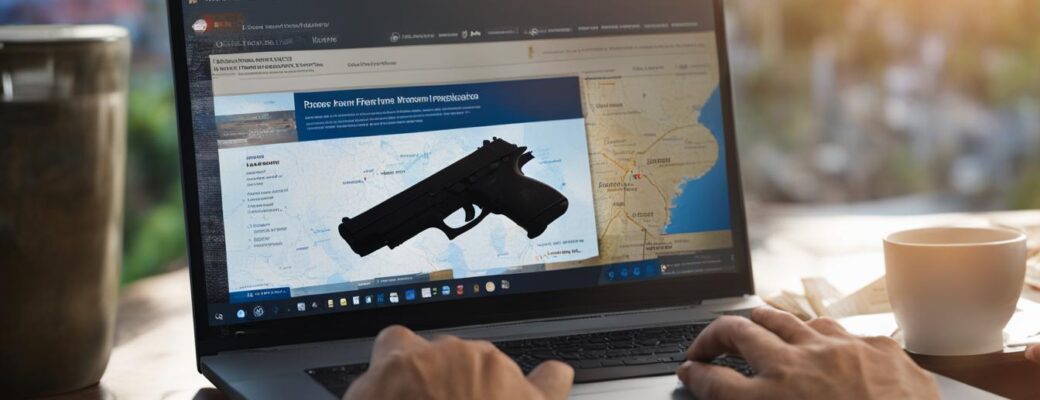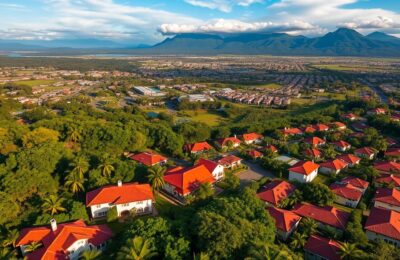Understanding if an Expat Can Own a Gun in Costa Rica
Gun ownership is a topic of great importance and debate in many countries around the world. For expatriates living in Costa Rica, understanding the regulations and laws surrounding gun ownership is essential. As an expat, it is crucial to know whether you can own a gun in Costa Rica and what the requirements are for gun ownership.
Unlike in the United States, gun ownership is not a constitutional right in Costa Rica. Only citizens of Costa Rica and Permanent Residents with a valid permanent residency card are allowed to own, register, or carry weapons. Temporary Residents, including expatriates, are not eligible to own guns.
The current limit for gun ownership in Costa Rica is three handguns per person, but this limit will soon be reduced to two. It’s important to note that military weapons like assault rifles are prohibited from being owned by private individuals. Additionally, gun permits in Costa Rica must be renewed every two years and require individuals to undergo psychological tests. The Law of Arms and Explosives and its accompanying regulations govern gun ownership in Costa Rica.
With these regulations in mind, expatriates should familiarize themselves with the specific requirements and restrictions regarding gun ownership in Costa Rica. By understanding the laws and abiding by them, expats can ensure that they are legally compliant and avoid any potential legal issues.
Key Takeaways
- Gun ownership in Costa Rica is restricted to citizens and Permanent Residents.
- Temporary Residents, including expatriates, are not eligible to own firearms.
- The current limit for gun ownership is three handguns per person, soon to be reduced to two.
- Military weapons like assault rifles are prohibited for private individuals.
- Gun permits in Costa Rica must be renewed every two years and require psychological tests.
Who can own a gun in Costa Rica?
In Costa Rica, gun ownership is restricted to citizens of Costa Rica and Permanent Residents with a valid permanent residency card. This means that temporary residents, including expatriates, are not eligible to own, register, or carry firearms. The law in Costa Rica is clear that only citizens and Permanent Residents have the right to possess guns. This restriction is in place to ensure that individuals who own guns are fully integrated into the country and have a long-term commitment to the community.
Additionally, there are certain individuals who are prohibited from owning firearms in Costa Rica. Those with criminal records, such as drug arrests, involvement in acts of violence, domestic violence, sex crimes, and other violent acts, are not allowed to possess guns. Furthermore, individuals with physical impairments that would impair their ability to handle firearms safely are also restricted from gun ownership. These measures are in place to prioritize public safety and ensure that only responsible individuals have access to firearms.
The gun ownership laws in Costa Rica reflect a cautious approach to firearm regulation, with the main focus being on citizen and Permanent Resident safety. By restricting gun ownership to individuals who are fully integrated into the country and have a clean criminal record, the authorities aim to maintain a safe and secure environment for all residents. Expatriates who are temporary residents should familiarize themselves with the local laws and regulations regarding gun ownership to ensure compliance and avoid any legal issues.
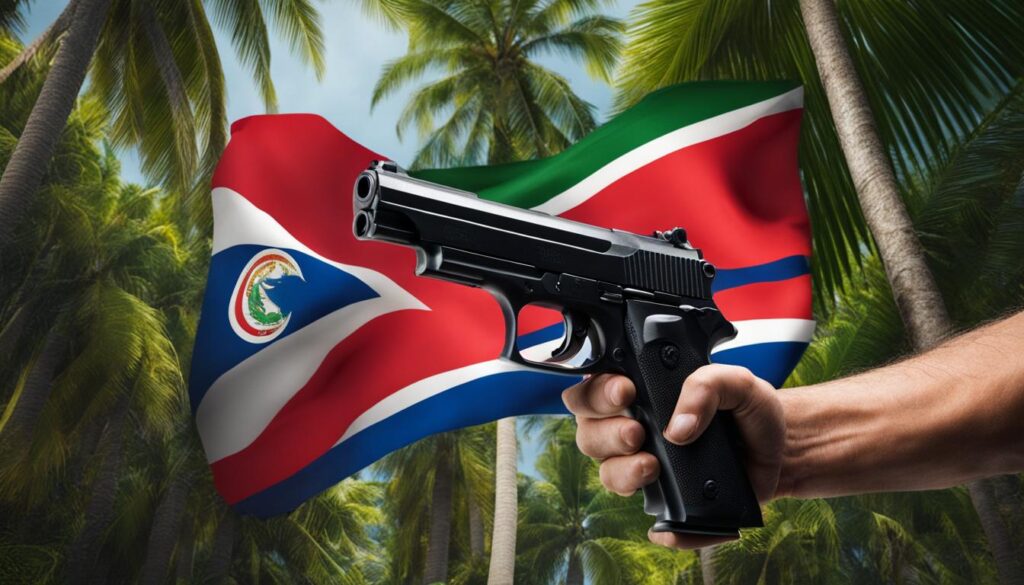
Summary:
- Gun ownership in Costa Rica is limited to citizens and Permanent Residents with a valid permanent residency card.
- Temporary residents, including expatriates, are not eligible to own, register, or carry firearms.
- Individuals with criminal records and physical impairments are prohibited from owning guns.
- The gun ownership laws in Costa Rica prioritize public safety and aim to ensure that only responsible individuals have access to firearms.
Bringing a Gun to Costa Rica as an Expat
As an expat in Costa Rica, if you wish to bring your firearms with you, there are certain legal requirements that you must fulfill. Firstly, you must have legal residency or apply for a concealed carry permit. Non-residents are not able to obtain a concealed weapons permit in Costa Rica. Once you have met this requirement, you can proceed with the process of bringing your firearm into the country.
To bring a gun to Costa Rica, you will need to obtain import permits that are approved by the government. The Ministry of Public Security is responsible for issuing firearm permits, and the process can take up to two months. It is essential to plan ahead and ensure that you have all the necessary permits before traveling to Costa Rica with your firearm.
Upon arrival in Costa Rica, you must declare the firearm at the Customs office and register it with the Ministry of Public Security. Failure to declare the firearm or comply with the registration process can result in legal consequences. It is crucial to follow all the necessary steps and procedures to ensure compliance with the law and to avoid any potential issues.
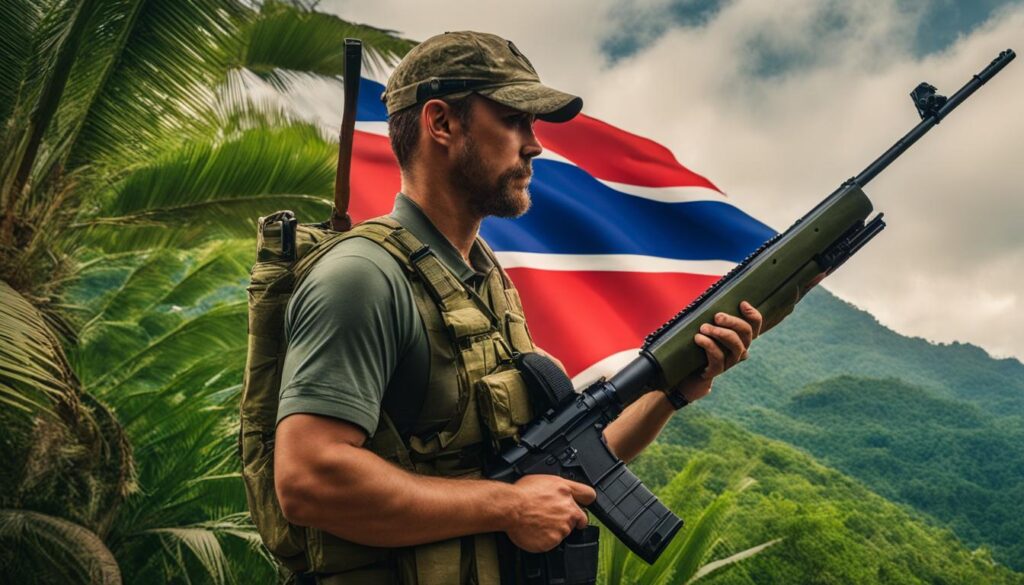
“Expats who wish to bring their firearms to Costa Rica must have legal residency or apply for a concealed carry permit.”
Purchasing a gun in Costa Rica
Expats residing in Costa Rica who meet the legal requirements have the opportunity to purchase firearms from licensed gun shops or private individuals. However, the process of obtaining a gun permit in Costa Rica is thorough and involves several steps to ensure safety and compliance with regulations.
Gun permit application process
The process begins with submitting the necessary documents, including proof of legal residency or permanent residency, identification documents, and a completed gun permit application form. Applicants are also required to pass a written examination and undergo a psychological exam conducted by a government-certified psychologist to assess their mental fitness for gun ownership.
Background checks and criminal records
Additionally, a comprehensive background check is conducted by the Judicial Investigation Police to verify an applicant’s criminal record. Any individuals with a history of violent crimes, drug arrests, domestic violence, or other serious offenses will be ineligible for gun ownership in Costa Rica. This strict vetting process is in place to ensure that only responsible and law-abiding individuals can possess firearms.
Licensing fees and waiting periods
Upon successful completion of the application process and passing all required examinations, applicants must pay the necessary licensing fees. Once the fees are paid, the Ministry of Public Security reviews the application and issues the gun permit. The entire process can be lengthy and may take several months from start to finish. It is important for expats to be prepared for the waiting period and to provide all required documentation in a timely manner to avoid any delays in the application process.
| Gun Purchase Process in Costa Rica | Requirements |
|---|---|
| Submit gun permit application | Legal residency or permanent residency, identification documents, completed application form |
| Pass written examination and psychological exam | Evaluation of mental fitness for gun ownership |
| Undergo background check | Judicial Investigation Police verifies criminal record |
| Pay licensing fees | Applicant covers the costs associated with the gun permit |
| Review and approval | The Ministry of Public Security reviews the application and issues the gun permit |
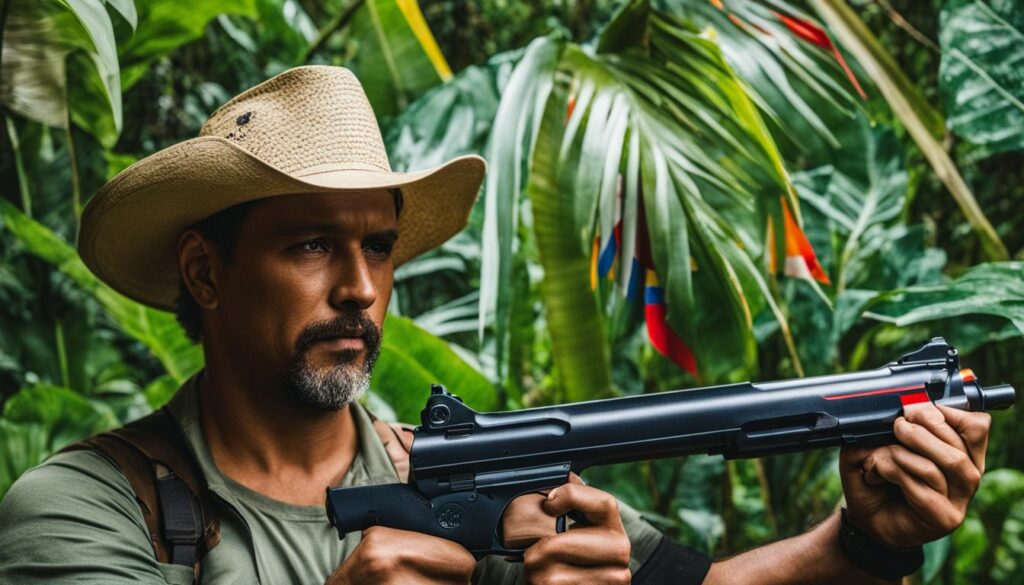
Comparison to Gun Ownership Laws in the United States
Gun ownership laws in Costa Rica are much stricter compared to the United States. In the US, gun ownership is a constitutional right protected by the Second Amendment. Almost anyone can obtain weapons in the US due to weak background checks and lack of thorough regulation. However, in Costa Rica, gun ownership is not a constitutional right, and only citizens and Permanent Residents are allowed to own guns. The law in Costa Rica restricts gun ownership for individuals with criminal records and physical impairments.
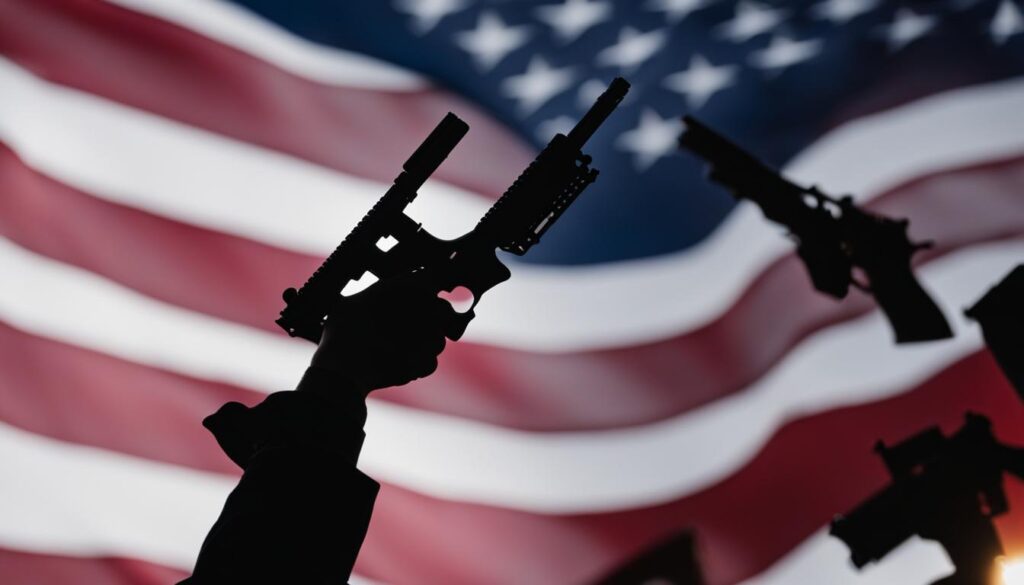
Compared to Costa Rica, the United States has more relaxed gun ownership laws. The Second Amendment of the US Constitution guarantees the right of citizens to keep and bear arms. This has led to a higher number of firearms in circulation and a broader range of gun ownership rights. However, this has also resulted in a higher number of gun-related incidents and a more polarized debate on gun control.
In the United States, background checks for gun purchases are required, but there are loopholes that allow individuals to acquire firearms without undergoing a thorough screening process. Additionally, each state has its own gun laws, resulting in variations in regulations across the country. While some states have implemented stricter measures, others have more lenient gun ownership requirements.
It is important for expats in Costa Rica to understand the differences in gun ownership laws between the two countries. Expats coming from the United States may find it challenging to adapt to the stricter regulations in Costa Rica. It is crucial to comply with the local laws and regulations to avoid legal issues and ensure the safety and security of both the individual and the community.
Gun Ownership Laws in Other Countries
Gun ownership laws vary across different countries, especially in popular retirement locations. It is important for expats to understand the regulations in these countries before considering gun ownership. Here is a comparison of gun ownership laws in a few countries:
Mexico
In Mexico, citizens and foreigners with temporary or permanent residence status can own firearms with certain restrictions. The process includes obtaining a permit from the Ministry of Defense and registering the firearm with the National Registry of Firearms. However, there are limitations on the types of firearms that can be owned, and the possession of military-grade weapons is strictly prohibited.
Belize
In Belize, the process for obtaining a firearm license involves a thorough background check, character references, and completing an application form. Applicants must also provide a genuine reason for owning a firearm, such as self-defense or hunting. The government may impose additional requirements, including completion of a firearm safety course.
Italy
In Italy, gun ownership is allowed with certain requirements and restrictions. Individuals must obtain a firearm license from the central government authority, which involves background checks, medical checks, and proof of a genuine reason for owning a firearm. Additionally, applicants must pass a written exam and demonstrate proficiency in handling firearms through a practical test.
Thailand
Thailand also has specific regulations regarding gun ownership. Foreigners can own firearms in Thailand, but they must meet certain criteria and obtain a firearm license. The process involves providing documentation, including a valid visa, proof of residence, and proof of employment or business ownership. Additionally, applicants must pass a background check and undergo a medical examination.
It is crucial for expats to thoroughly research the gun ownership laws in their chosen country of residence to ensure compliance and avoid legal issues. Each country has its own unique regulations, requirements, and restrictions that must be followed when it comes to gun ownership.

Conclusion
Gun ownership for expats in Costa Rica is strictly regulated and limited to citizens and Permanent Residents. Temporary Residents, including expatriates, are not eligible to own firearms in the country. The process to obtain a gun permit involves background checks, psychological exams, and submission of required documentation. It is crucial for expats to understand and comply with the gun ownership laws in Costa Rica to avoid legal issues and ensure adherence to the regulations.
Compared to the United States, where gun ownership is protected by the Second Amendment, gun ownership laws in Costa Rica are much stricter. In the US, almost anyone can obtain firearms with weak background checks and limited regulation. However, in Costa Rica, gun ownership is not a constitutional right, and it is subject to thorough restrictions.
Expats considering gun ownership in Costa Rica should familiarize themselves with the specific regulations and requirements. It is advised to consult with legal professionals or local authorities to ensure compliance with the law. By understanding and adhering to the gun ownership laws in Costa Rica, expats can navigate the process smoothly and responsibly exercise their rights within the country.
FAQ
Can an expat own a gun in Costa Rica?
No, only citizens of Costa Rica and Permanent Residents with a valid permanent residency card are allowed to own, register, or carry guns in Costa Rica. Temporary Residents, including expatriates, are not eligible to own firearms.
What are the legal requirements for expats to own a gun in Costa Rica?
To own a gun in Costa Rica, expats must be citizens or Permanent Residents with a valid permanent residency card. They must also pass a written examination, a psychological exam conducted by a government-certified psychologist, and undergo background checks.
Can expatriates bring their firearms to Costa Rica?
Yes, expatriates can bring their firearms to Costa Rica, but the process involves obtaining import permits approved by the government. The Ministry of Public Security issues firearm permits, and the process can take up to two months. Upon arrival in Costa Rica, the firearm must be declared at the Customs office and registered with the Ministry of Public Security.
How can expats purchase a gun in Costa Rica?
Expats in Costa Rica can purchase firearms from licensed gun shops or private individuals. To buy a new gun, individuals must provide information about the gun shop, serial number, and other purchase details. They must also pass a written examination and a psychological exam conducted by a government-certified psychologist. A criminal background check is conducted by the Judicial Investigation Police.
How do gun ownership laws in Costa Rica compare to the United States?
Gun ownership laws in Costa Rica are much stricter compared to the United States. In the US, gun ownership is a constitutional right protected by the Second Amendment. Almost anyone can obtain weapons in the US due to weak background checks and lack of thorough regulation. However, in Costa Rica, gun ownership is not a constitutional right, and only citizens and Permanent Residents are allowed to own guns. The law in Costa Rica restricts gun ownership for individuals with criminal records and physical impairments.
What are the gun ownership laws in other countries?
Gun ownership laws vary in different countries. In Mexico, citizens and foreigners with temporary or permanent residence status can own firearms with certain restrictions. Belize, Ecuador, Panama, Colombia, and Thailand also have specific regulations regarding gun ownership for citizens and residents. In Vietnam, civilians are prohibited from possessing firearms. In European countries like France, Italy, Spain, and others, gun ownership is allowed with certain requirements, including licenses, background checks, and specific purposes for gun ownership.
Source Links
- https://www.liveincostarica.com/blog/2019/08/retirees-should-know-about-costa-ricas-strict-gun-laws.html
- http://costarica-information.com/about-costa-rica/economy/economic-sectors-industries/real-estate/real-estate-general/moving-to-costa-rica/moving-import/importing-firearms
- https://internationalliving.com/gun-laws-by-country-how-the-right-to-bear-arms-applies-overseas-trl/

